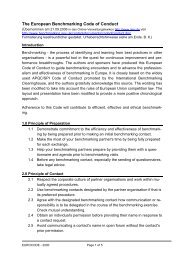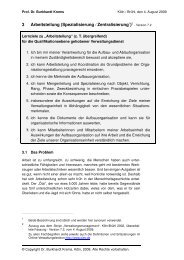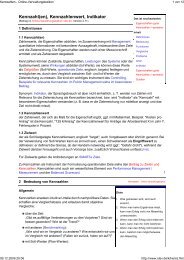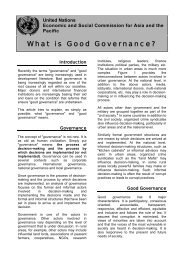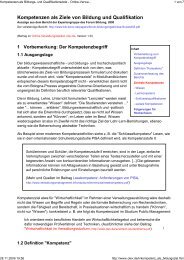Strategy Survival Guide
Strategy Survival Guide
Strategy Survival Guide
You also want an ePaper? Increase the reach of your titles
YUMPU automatically turns print PDFs into web optimized ePapers that Google loves.
Engaging with stakeholders<br />
Having identified those stakeholders that will be most closely involved with the project, it is necessary to<br />
identify how best to engage with them throughout the various stages of the project.<br />
The key elements of a positive stakeholder relationship include:<br />
• Early agreement of the need to work together to deliver results<br />
• Meetings to establish project parameters, success criteria and potential constraints or barriers<br />
• Review and agreement of key issues<br />
• Early flagging of problems<br />
• Constant updates on progress.<br />
The table below identifies some of the steps to stakeholder engagement throughout 4 phases of the strategy<br />
process.<br />
Phase<br />
Key Stakeholder Management Tasks<br />
Justification & Set Up • Agree objectives and questions to be answered<br />
• Determine process for consultation<br />
• Discussion of broad issues<br />
Research & Analysis • Identify key concerns/issues and collect knowledge<br />
• Communicate emerging conclusions<br />
Strategic Direction Setting • Seek views as to emerging strategic options<br />
• Communicate chosen option<br />
Policy and Delivery Design • Consult on policy design, especially those responsible for<br />
implementation<br />
• Secure collective agreement if required<br />
There are a number of approaches to engaging with stakeholders, including:<br />
• One to one meetings (usually required on regular basis with influential stakeholders)<br />
• Inviting stakeholders to sit on Steering, Advisory or Working Groups<br />
• Presentations to staff/senior management teams/boards<br />
• Recruiting team members from stakeholder organisations<br />
• Joint working with stakeholder organisations on key issues<br />
• Conducting a public consultation exercise and preparing an interim report for publication<br />
• Seminars for broader debate of particular issues or topics<br />
• Written communications, for example in the form of newsletters, updates or drafts of papers<br />
• E-mails<br />
• Web sites posting up key papers<br />
• Focus groups and seminars - for example, these might be a useful way of involving members of a<br />
sector, representative organisations and users.<br />
Different approaches are likely to be appropriate for different stakeholders. A combination of approaches is<br />
likely to be most effective, especially for key stakeholders.<br />
<strong>Strategy</strong> <strong>Survival</strong> <strong>Guide</strong> – <strong>Strategy</strong> Skills<br />
Page 80



